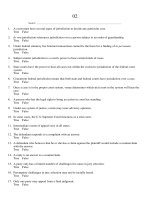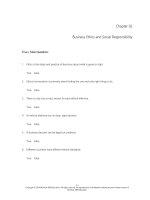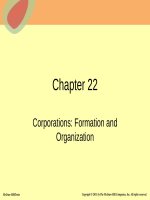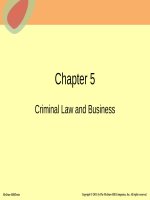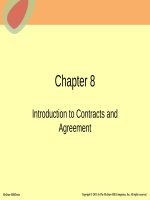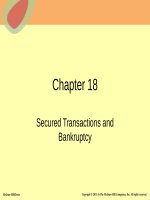- Trang chủ >>
- Thạc sĩ - Cao học >>
- Luật
Lecture Dynamic business law, the essentials (2/e) - Chapter 11: Reality of assent
Bạn đang xem bản rút gọn của tài liệu. Xem và tải ngay bản đầy đủ của tài liệu tại đây (216.02 KB, 9 trang )
Chapter 11
Reality of Assent
McGrawHill/Irwin
Copyright © 2013 by The McGrawHill Companies, Inc. All rights reserved.
Legal Assent
• Definition: Voluntary, willing promise to transact the law will
require contracting parties to obey
• Without assent, contract may be avoided/rescinded
• Cancellation of contract due to lack of assent means party
with power of avoidance can require return of consideration
given to other party; similarly, party with rescission right
must return consideration received from other party
• Major “obstacles” to legal assent: Mistake,
misrepresentation, undue influence, duress, and
unconscionability
112
Mistake
• Definition: Misunderstandings regarding material facts
of contract at time agreement made
• Unilateral Mistake: Mistake made by one contracting
party; generally, contract still binding
• Mutual (Bilateral) Mistake: Mistake made by both
parties; if mutual mistake of material (significant) fact,
either party can rescind contract
113
For a mutual mistake to interfere with
legal consent, it must involve:
• A basic assumption about the subject matter
of the contract;
• A material effect on the agreement; and
• An adverse effect on a party who did not
agree to bear the risk of mistake at the time
of the agreement
114
Negligent or Fraudulent Misrepresentation
• Negligent Misrepresentation (Definition): Negligent,
untruthful assertion of material fact by contracting party;
aggrieved party can rescind contract, and sue for damages
-Contrast with “innocent misrepresentation”, when party
making false assertion believes it to be true, and is not
negligent in making false assertion; although innocent
misrepresentation permits misled party to rescind
contract, he/she cannot sue for damages
• Fraudulent Misrepresentation (Definition): Intentional,
untruthful assertion of material fact by contracting party;
aggrieved party can rescind contract, and sue for damages
• Courts permit contract rescission for negligent or fraudulent
misrepresentation, assuming:
-False assertion
-Negligence resulting in deception, or intent to deceive
-Justifiable reliance on false assertion by innocent party
115
Undue Influence
• Definition: Persuasive efforts of dominant party, who
uses special relationship to unduly persuade the other
party
• Any relationship involving one party’s unusual degree
of trust in another can give rise to undue influence
-Examples include attorney-client relationship, and
doctor-patient relationship
116
Questions Affecting Determination of
Undue Influence
• Did dominant party “rush” the other party to
consent?
• Did dominant party gain unjust enrichment from the
agreement?
• Was non-dominant party isolated from other
advisers at time of agreement?
• Is contract unreasonable, in that it overwhelmingly
benefits dominant party?
117
Duress
• Definition: Occurs when one party threatens
other with wrongful act unless assent given
• Duress is not legal assent, since coercion
interferes with contracting party’s free will
• For courts to rescind agreement, injured party
must prove duress left no reasonable alternatives
to contractual agreement
118
Situations Involving Duress
• One party threatens physical harm or extortion to gain
consent to contract
• One party threatens to file criminal lawsuit unless
consent given to terms of contract
• One party threatens to file frivolous civil lawsuit unless
consent given to terms of contract
• One party threatens the other’s economic interests
(although in many jurisdictions, recovery based on
economic duress/pressure rarely granted)
119
